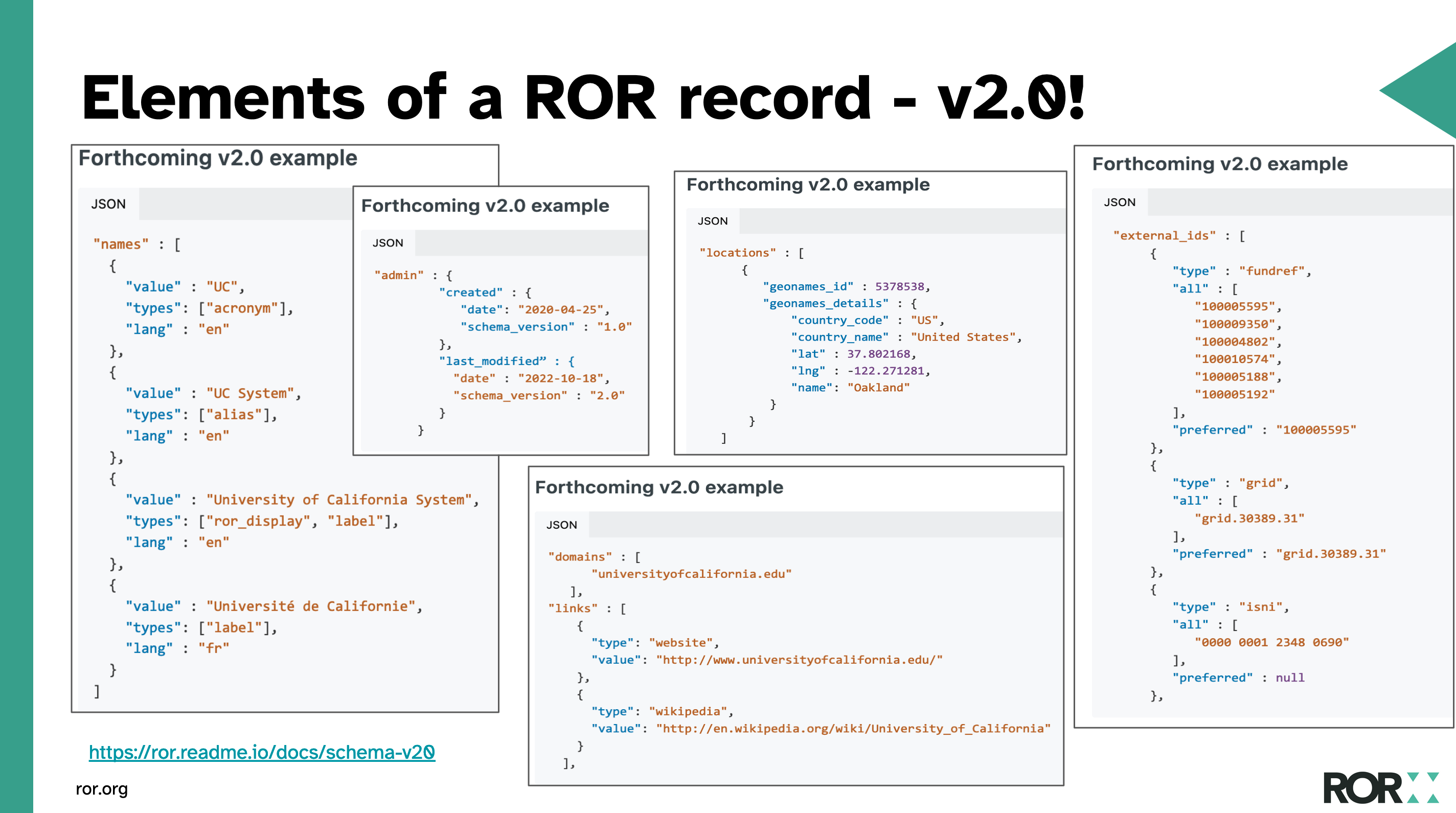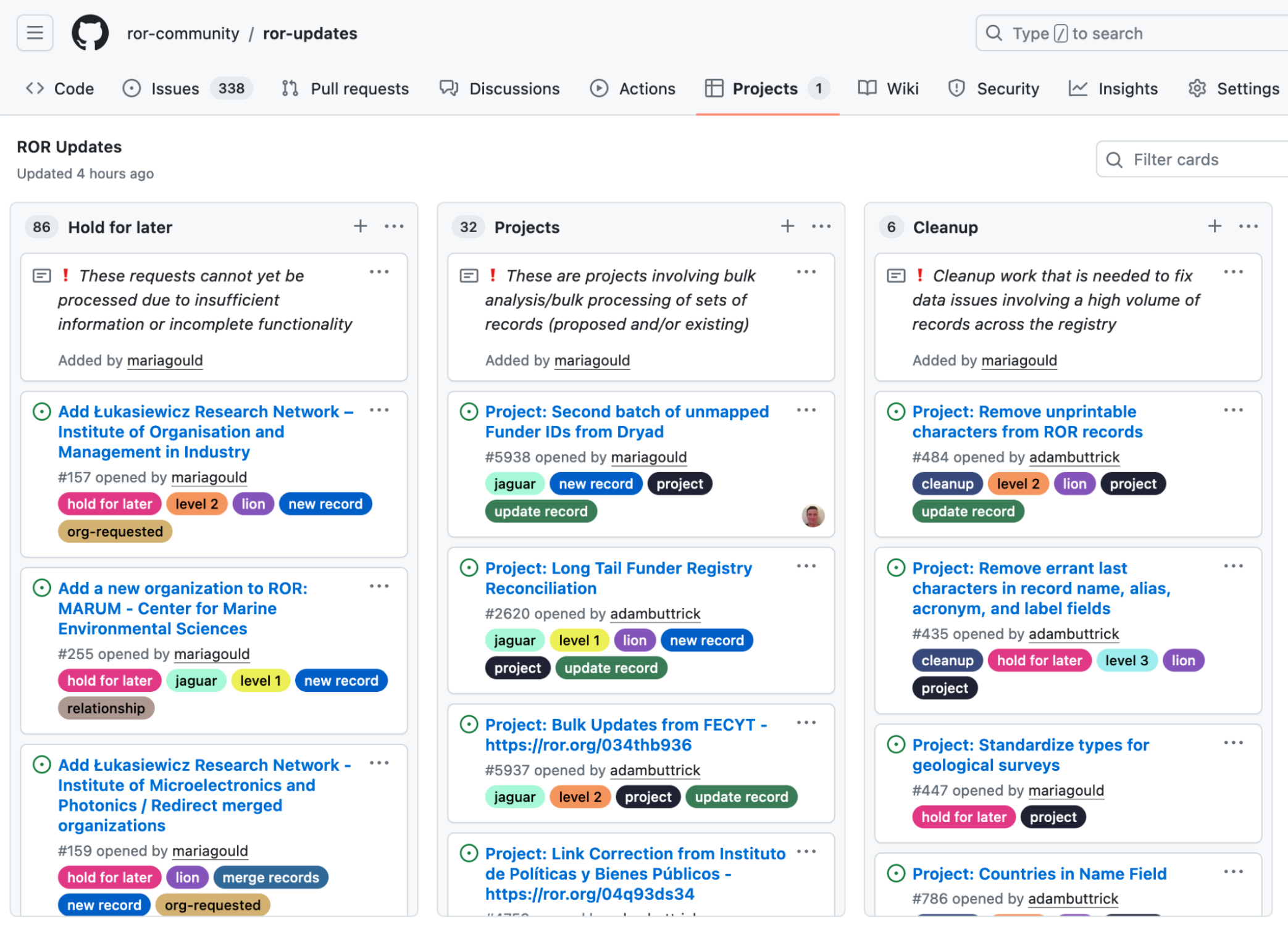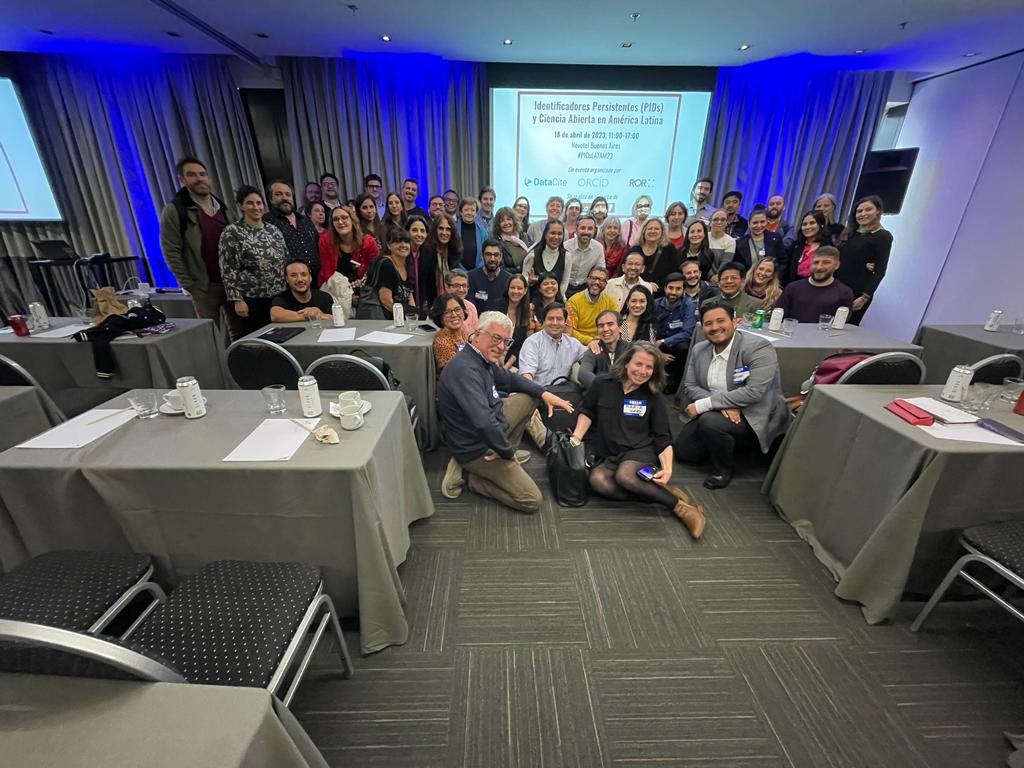As we near the end of 2023, we are taking a moment to reflect on what has been another significant year for ROR. We are thrilled that ROR is widely recognized and trusted as the leading standard for organization identifiers. This recognition is reflected in the skyrocketing use of ROR’s API (which reached a high of 27 million requests per month), wide range of implementations across the research ecosystem, and non-stop activity in ROR’s curation pipeline (currently handling approximately 700 requests per month). This momentum signals the broad adoption of ROR as well as the unequivocal need for something like ROR to fill crucial gaps in the landscape and address critical use cases around the tracking of research outputs. Heading into 2024, we expect that this growth will continue and that even more use cases will continue to develop.
Looking back on 2023, we wanted to highlight a selection of milestones from the past year that we are especially proud of and that particularly represent ROR’s unique journey so far.
ROR as a new solution for identifying funders and addressing key use cases for funding metadata
In September, Crossref and ROR announced that the Open Funder Registry would be merged into ROR. With a significant number of Funder IDs already represented in the registry, ROR is well positioned to incorporate the Funder Registry and be used in research and publishing systems to identify funding organizations. Users are beginning to switch from the Funder Registry to ROR, and we’ll be sharing more updates on this progress as the transition continues into the new year.

Aggregate overlap between Crossref Open Funder Registry and ROR as of October 2023
Notable ROR integrations announced, updated, and completed
ROR adoption in publishing platforms continues to grow, with recent developments in AAAS’s Science Content Tracking System, Octopus, Janeway, ResearchEquals, and ScienceOpen. This year saw more integrations in repository and CRIS systems such as figshare for Institutions, ChemrXiv, DSpace-CRIS, InvenioRDM, and Zenodo; and in many other tools and indexes such as the COKI Open Access Dashboard and OA.Report. We’re looking forward to hearing about and announcing even more ROR integrations in 2024. Throughout the year, the ROR blog featured in-depth conversations with ROR adopters about how and why they are using ROR to address key needs in their workflows. Check out the complete list of case studies, and let ROR know if you have suggestions for upcoming features.

ROR adopter case studies
Development of version 2 of the ROR schema and API
Following extensive community input, ROR developed the first major update to its schema and API (v2), which will incorporate key feedback from users and integrators and enable ROR to build upon the data model originally inherited from GRID. The beta version of the new schema was released in September, and the production release is expected early in the new year.

Elements of ROR schema version 2
Enhancing ROR’s global coverage and metadata quality
This year marked significant growth in ROR’s community-based curation model and included a number of dedicated efforts to improve the registry’s coverage in specific areas. These efforts included–among many others–a collaboration with France’s Ministère de l’enseignement supérieur et de la recherche focused on representation of French research organizations and their research units, comprehensive reviews of Latin American and Caribbean organization records by members of LA Referencia, and analyses of Spanish organizations by both FECYT and CSIC have contributed to enhancing the data quality and coverage for the country. In the United States, collaborations with government organizations such as the U.S. Department of Energy Office of Scientific and Technical Information, NOAA, and the Defense Technical Information Center have ensured more comprehensive and accurate representation of US government organizations. We are grateful for the numerous contributions provided by ROR’s community, which have greatly enhanced the registry’s value and utility.

ROR Curation Updates projects board on GitHub
Participation in a range of community events
In 2023 we joined community members in person and online at the Society for Scholarly Publishing annual meeting, the #PIDsLATAM workshop in Buenos Aires, a workshop at the Open Repositories conference, the biannual meeting of the International Society for Scientometrics and Informetrics (ISSI), and a number of webinars with collaborators including ORCID, DataCite, AfricArXiv, and DOE/OSTI.

Participantes (¡Felices!) del evento PIDs y ciencia abierta en América Latina
We will be kicking off the new year with a celebration of ROR’s fifth anniversary at the end of January. Every year since ROR’s launch, we have celebrated the anniversary with an open community meeting to reflect on the past and plan for the future. The 2024 meeting will be an opportunity to mark five years of ROR and bring the community together to discuss the next five years and beyond. Stay tuned for more information about the celebration, and in the meantime please reserve the slots on your calendar by registering at the links on ROR’s Events page.
ROR wouldn’t be ROR without the community behind it. We express our sincere gratitude and appreciation for the many ways in which community members around the world have supported and engaged with ROR over the past year: showing up to community calls, giving us feedback on ROR’s technical development work, submitting registry updates, building ROR implementations, making financial contributions, and much much more.
Here’s to 2023, and to ROR-ing more in 2024!
RSS Feed
Categories
Archives
Tags
- adoption
- annual-meeting
- api
- aps
- caltechdata
- clarivate
- clear-skies
- coki
- communication
- community
- cross-post
- crossref
- curation
- data
- datacite
- datasalon
- development
- dryad
- europepmc
- facilities
- fairsharing
- feedback
- figshare
- funders
- governance
- grei
- grid
- hierarchy
- implementation
- integrations
- interviews
- inveniordm
- jobs
- latin-america
- machine-learning
- matching
- metadata
- mvr
- open-access
- open-infrastructure
- openalex
- optica
- orcid
- osf
- persistent-identifiers
- pidapalooza
- pids
- prototype
- publishers
- publishing
- registry
- research-integrity
- researchequals
- resources
- rockefeller-university-press
- rrid
- schema
- scholastica
- silverchair
- steering-group
- straininfo
- sustainability
- team
- web-of-science
- working-group
- zenodo